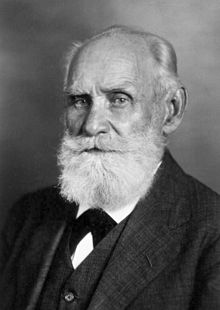Ivan Petrovich Pavlov
| Ivan Pavlov | |
|---|---|
 |
|
| Born |
26 September 1849 Ryazan, Russian Empire |
| Died | 27 February 1936 (aged 86) Leningrad, Soviet Union |
| Residence | Russian Empire, Soviet Union |
| Fields | Physiologist, physician |
| Institutions | Imperial Military Medical Academy |
| Alma mater | Saint Petersburg University |
| Doctoral students | Pyotr Anokhin, Boris Babkin, Leon Orbeli |
| Known for |
Classical conditioning Transmarginal inhibition Behavior modification |
| Influences |
Karl Vogt Jacob Moleschott |
| Influenced |
John B. Watson B. F. Skinner |
| Notable awards |
|
Ivan Petrovich Pavlov (Russian: Ива́н Петро́вич Па́влов; IPA: [ɪˈvan pʲɪˈtrovʲɪtɕ ˈpavləf]; 26 September [O.S. 14 September] 1849 – 27 February 1936) was a Russian physiologist known primarily for his work in classical conditioning. From his childhood days Pavlov demonstrated intellectual curiosity along with an unusual energy which he referred to as "the instinct for research". Inspired by the progressive ideas which D. I. Pisarev, the most eminent of the Russian literary critics of the 1860s, and I. M. Sechenov, the father of Russian physiology, were spreading, Pavlov abandoned his religious career and devoted his life to science. In 1870 he enrolled in the physics and mathematics department at the University of Saint Petersburg in order to study natural science. Pavlov won the Nobel Prize for Physiology or Medicine in 1904, becoming the first Russian Nobel laureate. A Review of General Psychology survey, published in 2002, ranked Pavlov as the 24th most cited psychologist of the 20th century. Pavlov's principles of classical conditioning have been found to operate across a variety of experimental and clinical settings, including educational classrooms.
Ivan Pavlov, the eldest of eleven children, was born in Ryazan, Russian Empire. His father, Peter Dmitrievich Pavlov (1823–1899), was a village Russian orthodox priest. His mother, Varvara Ivanovna Uspenskaya (1826–1890), was a devoted homemaker. As a child, Pavlov willingly participated in house duties such as doing the dishes and taking care of his siblings. He loved to garden, ride his bicycle, row, swim, and play gorodki; he devoted his summer vacations to these activities. Although able to read by the age of 7, Pavlov was seriously injured when he fell from a high wall onto stone pavement; he did not undergo formal schooling until he was 11 years old as a result of his injuries.
...
Wikipedia
